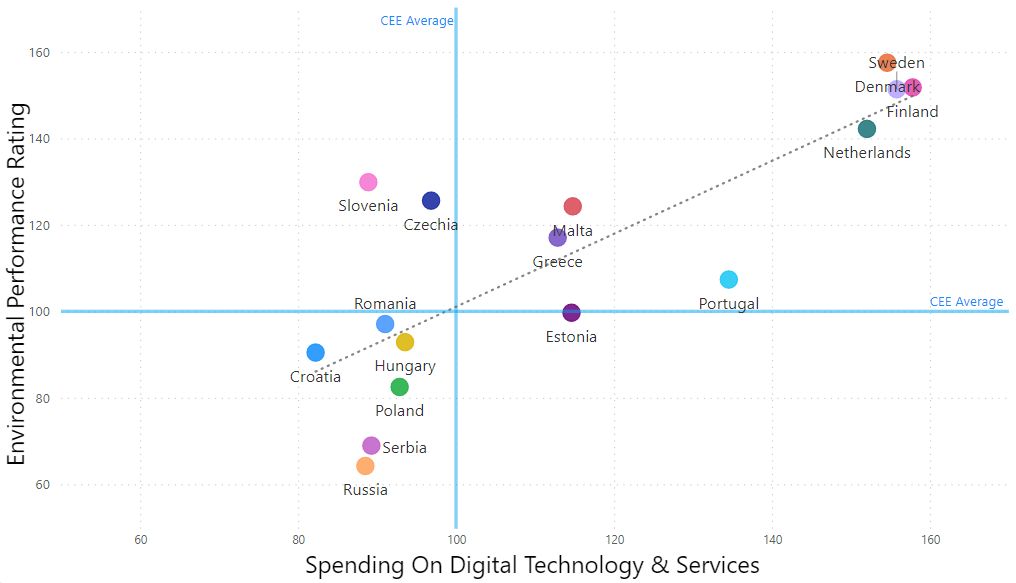This post is also available in:
![]() Română
Română
On November 24, 2021, Philippe ROGGE | President | Microsoft Central & Eastern Europe published a manifesto article on Digital Transformation on LinkedIn . We reproduce it here for the readers of our magazine and of the portal of the Romanian Communications industry.


Digital transformation at the company level
it will accelerate economic and social progress – if we act immediately.
The whole region of Central and Eastern Europe (EEC) has many digital talents and young people with courageous goals. For example, globally, Malta and Estonia are considered leaders in the digitization of public services and have been ranked by the European Commission in the top two places in Europe in terms of digital governance. At the same time, the value of technology companies in the region has increased 19 times in the last decade, led by names such as UiPath, a Romanian company considered “decacorn” or Infobip in Croatia.
However, we are far from fully realizing the potential of the region.
In this context, we conducted the Digital Futures Index , a research that aims to map digital progress and shows that the more digitally advanced countries perform better economically and socially.
Digitally advanced states are more innovative, have more competitive and efficient savings, but also a lower level of pollution.

In many ways, Central and Eastern European countries and companies are as digitally developed as the nations that are considered leaders in digitalization, and in other respects they have huge potential to integrate digital transformation and its benefits. .
By accelerating digitalisation, the entire Central and Eastern European region can become self-sufficient, helping to shape a digital future for Europe and for all of us, as well as maintaining long-term competitiveness .
We are at a very important point where each of us has a role to play. Thus, the leaders of small businesses or those of large companies, in any sector of activity, are strategically positioned to make a difference. Only if we act immediately.
Digital leadership is key
As previously stated by other specialized sources, our research also indicates that investing in digital technologies is essential to increase competitiveness and meet the ever-changing expectations of consumers and professionals.
Investments in digital infrastructure and the classification of companies according to the degree of “digital competitiveness” are closely linked to the results of an economic and societal nature in general. Also, the adoption of cloud solutions, in particular, is closely linked to a higher degree of innovation and productivity.

In other words, digital companies are an engine of progress.
Not only investment in technology is important, however. In order to thrive and be successful, companies should also prioritize the development of digital skills among their employees, shaping digital leadership and an organizational culture focused on the hybrid work model.
IT professionals have a catalytic role:
The degree of innovation and the level of productivity increase with the number of IT specialists in the labor market.

With digital skills that meet current and future requirements, IT professionals can more effectively use and implement the latest advanced digital technologies across the organization, accelerating digitization and maximizing its impact on the business.
As a result of continuous improvement, IT specialists will become catalysts for digital transformation.
Digital leadership stimulates the development of:
Not only the IT talent needs to improve their skills, but also the other employees of the company. A company in which several senior executives have digital skills has a competitive advantage .

Our analysis has shown that superior digital skills, among the age groups of those in leadership positions in organizations, are associated with an increased level of competitiveness.
These digital-first leaders make it easier to make decisions that can unleash increased strategic value through digitization.
Ideas are born out of the office:
Employees’ expectations regarding work culture have constantly changed. Old ways of working endanger competitiveness, and talents increasingly choose to leave organizations. In addition, our data showed that during the pandemic, remote work generated innovations , including patent registrations, as well as higher productivity .

“Flexibility” is the key word. The best results appear not only as a result of remote work, or work exclusively in the office, but as a result of the proper interweaving of the two working patterns. Working on a hybrid model allows everyone to reach their full potential, no matter where they are, and no one wants a part of the team to perform poorly or half of their ideas to be lost.
Turning businesses into progressive, forward-looking companies helps both retain talent in the region and attract specialists back after they have gained experience abroad.
Passivity is therefore not an option – companies have to go digital or risk being overtaken by their competitors.
We all need to become digital performers
The data analysis revealed that supporting people to improve their digital skills leads to increased productivity and average wages – these are two hotspots of many countries in the region.
Through professional development and retraining processes, companies can have a huge impact here: the more digitally skilled employees are, the more they can make a greater contribution to their employers and the communities they belong to. There is incredible talent in Central and Eastern Europe, and by investing in people and developing their digital skills, as much as in digital technology, we can create greater unanimity among the digitally advanced.
That’s why at Microsoft we place a strong emphasis on developing digital skills in our digital transformation investment plans – as is the case in Poland and Greece.
We have the ability to generate and drive change
Europe aims to become a leader in the global digital economy. However, in the face of the US and China, Europe is facing a widening innovation gap, so that it is allocating trillions of euros to promote its innovation agenda and accelerate its transformation. digital.
The countries of Central and Eastern Europe can accelerate the achievement of our common goal – if we make progress, the whole of Europe will make a leap forward and thus secure a competitive future on the global stage.
It is not the current level of digitalization of a company or a state that is most important, but the speed with which they progress to become more innovative, more economically competitive and more energy efficient.
The next three priority steps we should definitely take are:
• enhancing and deepening the digital skills of all employees, especially those with decision-making positions;
• digitizing a larger number of processes to increase efficiency, as well as a greater number of services for the benefit of customers and citizens;
• adopting a hybrid work system, and not just technological solutions, so that employees can fully capitalize on their talent and companies can enjoy results.
We have everything we need to do this, so it all comes down to leadership. To understand the possibilities of digitization, we are inspired by the words of several leaders in the region, such as those in the rotating images below.
















